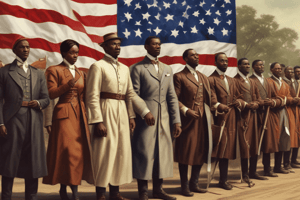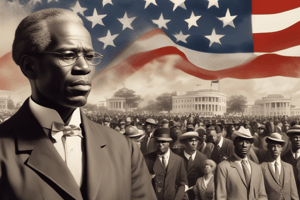Podcast
Questions and Answers
What requirement did Lincoln's 10 Percent Plan impose on Southern states to rejoin the Union?
What requirement did Lincoln's 10 Percent Plan impose on Southern states to rejoin the Union?
- All voters needed to pledge loyalty
- 10% of voters needed to pledge loyalty (correct)
- 50% of voters needed to pledge loyalty
- There was no requirement for loyalty pledges
What was a primary goal of the Radical Republicans during Reconstruction?
What was a primary goal of the Radical Republicans during Reconstruction?
- To ensure strict Reconstruction and rights for African Americans (correct)
- To reduce the power of the federal government
- To restore the Southern economy rapidly
- To remove all military presence from the South
Which amendment granted citizenship to anyone born or naturalized in the US
Which amendment granted citizenship to anyone born or naturalized in the US
- 16th Amendment
- 15th Amendment
- 13th Amendment
- 14th Amendment (correct)
What was the primary purpose of the Freedmen's Bureau?
What was the primary purpose of the Freedmen's Bureau?
What did the Compromise of 1877 effectively end?
What did the Compromise of 1877 effectively end?
Which farming system often led to debt for sharecroppers?
Which farming system often led to debt for sharecroppers?
What did the Jim Crow laws enforce in the South?
What did the Jim Crow laws enforce in the South?
Which organization was established to combat Klan violence and protect African American voting rights?
Which organization was established to combat Klan violence and protect African American voting rights?
What impact did the 15th Amendment have on African American rights?
What impact did the 15th Amendment have on African American rights?
What was a significant result of the Enforcement Acts?
What was a significant result of the Enforcement Acts?
Which factor contributed to the failure of Southern industrialization after the Civil War?
Which factor contributed to the failure of Southern industrialization after the Civil War?
What was a primary characteristic of Presidential Reconstruction under Andrew Johnson?
What was a primary characteristic of Presidential Reconstruction under Andrew Johnson?
What was the main purpose of the Black Codes enacted in the South?
What was the main purpose of the Black Codes enacted in the South?
What led to the impeachment of Andrew Johnson?
What led to the impeachment of Andrew Johnson?
What was the role of the Freedmen's Bureau after the Civil War?
What was the role of the Freedmen's Bureau after the Civil War?
What was the 'New South' Movement aimed at achieving?
What was the 'New South' Movement aimed at achieving?
What did sharecropping and tenant farming share in common?
What did sharecropping and tenant farming share in common?
What was a goal of the Radical Republicans during the Reconstruction era?
What was a goal of the Radical Republicans during the Reconstruction era?
Flashcards
10 Percent Plan
10 Percent Plan
Lincoln's plan for Southern states to rejoin the Union if 10% of voters pledged loyalty.
Radical Republicans
Radical Republicans
Congress members who wanted strict Reconstruction and rights for African Americans.
Military Reconstruction Act
Military Reconstruction Act
Divided the South into military districts to enforce Reconstruction laws.
14th Amendment
14th Amendment
Signup and view all the flashcards
Sharecropping
Sharecropping
Signup and view all the flashcards
Jim Crow Laws
Jim Crow Laws
Signup and view all the flashcards
Compromise of 1877
Compromise of 1877
Signup and view all the flashcards
Freedmen's Bureau
Freedmen's Bureau
Signup and view all the flashcards
Wade-Davis Bill
Wade-Davis Bill
Signup and view all the flashcards
Andrew Johnson
Andrew Johnson
Signup and view all the flashcards
Presidential Reconstruction
Presidential Reconstruction
Signup and view all the flashcards
Black Codes
Black Codes
Signup and view all the flashcards
What is the 14th Amendment?
What is the 14th Amendment?
Signup and view all the flashcards
What is the 15th Amendment?
What is the 15th Amendment?
Signup and view all the flashcards
Impeachment of Andrew Johnson
Impeachment of Andrew Johnson
Signup and view all the flashcards
Study Notes
Reconstruction Era
- 10 Percent Plan: Southern states could rejoin the Union if 10% of their voters pledged loyalty.
- Wade-Davis Bill: A stricter plan requiring 50% voter loyalty; Lincoln vetoed it.
- Andrew Johnson's Presidency: His lenient Reconstruction policies angered Congress.
- Presidential Reconstruction: Johnson's approach to quickly restore Southern states without protecting African Americans' rights.
- Black Codes: Southern laws restricting African Americans' freedoms and keeping them in poverty.
- Radical Republicans: Congress members who advocated for strict Reconstruction and African American rights.
- Military Reconstruction Act: Divided the South into military districts to enforce Reconstruction laws.
- 14th Amendment: Granted citizenship and equal protection under the law to African Americans.
- 15th Amendment: Guaranteed African American men the right to vote.
- Impeachment of Andrew Johnson: Johnson was nearly removed from office for defying a law and disagreeing with Congress.
- Sharecropping: Farming system where workers rented land in exchange for crops; often led to debt.
- Tenant Farming: Farmers rented land but had more decision-making power than sharecroppers; still faced debt.
- Crop-Lien System: A credit system where farmers used crops as collateral, trapping them in debt cycles.
- "New South" Movement: An effort to modernize Southern industry after the Civil War.
- Southern Industrialization: Efforts to industrialize the South; largely unsuccessful.
- Ku Klux Klan: A terrorist group that used violence to prevent African Americans from voting or exercising their rights.
- Enforcement Acts: Federal laws designed to stop Klan violence and protect African Americans' voting rights.
- Compromise of 1877: Ended Reconstruction by removing federal troops from the South.
- Redeemers: Southern Democrats who regained control and reversed Reconstruction reforms.
- Jim Crow Laws: Laws enforcing segregation and discrimination in the South after Reconstruction.
- Freedmen's Bureau: A government agency that provided food, jobs, and education to freed slaves.
Civil Rights Act of 1866
- Equal Rights and Citizenship: Granted African Americans equal rights and citizenship.
- African American voting and officeholding during Reconstruction: African Americans exercised the right to vote and held political offices during Reconstruction.
- Historically Black Colleges and Universities (HBCUs): Colleges established to educate African Americans after slavery.
- Reconstruction Successes: African Americans achieved temporary political power and citizenship rights.
Failures of Reconstruction
- Rights were not fully protected long term.
- Racism and discrimination continued.
Studying That Suits You
Use AI to generate personalized quizzes and flashcards to suit your learning preferences.




